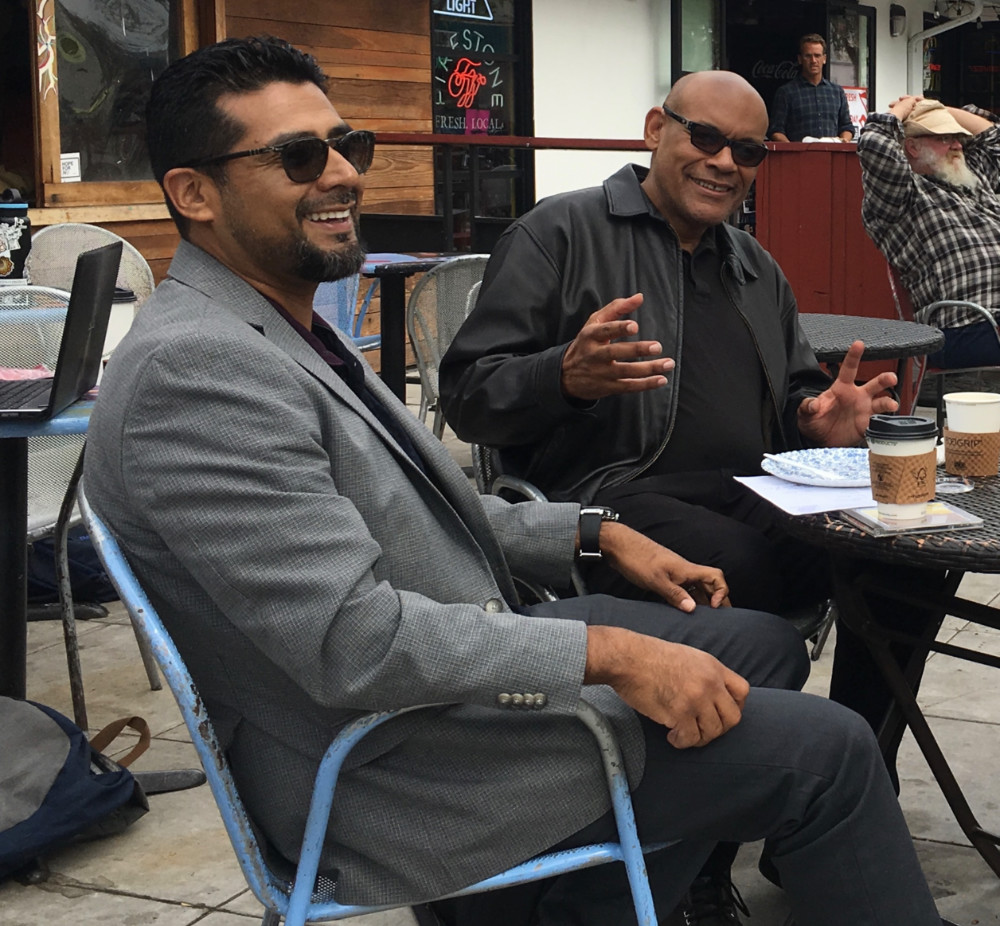
Building Futures
UC Santa Barbara Professors Jeffrey Stewart and Victor Rios are deeply invested in community engagement and centering the experiences of Black and Brown people on the margins of society. Their work just got a major boost.
Stewart, a professor of Black Studies, and Rios, a professor of sociology, have been named to John D. and Catherine T. MacArthur Foundation Chairs. Each professorship will be supported by a $1 million endowment for a five-year term, and the annual earnings on those funds will finance a range of activities.
Their project, “A New Eden in Southern California: Promoting Black and Brown Futures in Resilient Communities,” will include scholarly research, artistic projects and performances, and inclusive off-campus programs. The aim, they said, is to create interdisciplinary dialogues about racial and social justice, as well as public policy issues such as policing and criminal justice, that develop new models of community engagement and social sustainability for Black and Brown urban youth.
“On behalf of our entire UC Santa Barbara community, I offer my most heartfelt congratulations to Professor Jeffrey Stewart and Professor Victor Rios on the tremendous honor of being recognized with prestigious MacArthur Foundation Chairs,” said Chancellor Henry T. Yang. “Professors Stewart and Rios are brilliant researchers, teachers and scholars, and their outstanding work — individually and collectively — exemplifies the John D. and Catherine T. MacArthur Foundation’s commitment to a more just and peaceful world. We are extremely proud of this well-deserved recognition.
“Through their innovative and groundbreaking project, Professor Stewart and Professor Rios seek to create transformative change around issues of social, racial, and criminal justice and advance the critical work toward a more equitable future,” Yang continued.
Stewart and Rios’s work together has its roots in Jeffrey’s Jazz Coffeehouse, which Stewart started following the 2014 shootings in Isla Vista.
Stewart, whose “The New Negro: The Life of Alain Locke” (Oxford University Press) won the 2019 Pulitzer Prize for Biography and the 2018 National Book Award for Nonfiction, created the pop-up jazz venues to give students a place to connect and heal after the tragedy.
Rios, who has worked with at-risk youth in the criminal justice system, ran forums on a range of social issues during breaks between sets at Jeffrey’s Jazz Coffeehouse.
“And so we just would have these conversations,” Stewart said. “Was there a way to maybe fuse these two initiatives, one kind of trying to create a space for transformation through culture or music or jazz or spaces in cities?”
Enter the MacArthur Foundation Chairs, which were established in 2009 to support research, teaching and public service. The endowments, Stewart and Rios said, will give them the resources to pursue initiatives that bring the university to the community — in the Santa Barbara area and beyond.
One of the first steps is bringing back and expanding Jeffrey’s Jazz Coffeehouse, which has been on hiatus during the COVID lockdowns. In time they’d like to see it spread into the Los Angeles area, where they could talk to young people — who would otherwise have no opportunity to speak with a university professor — and help them see that they have a future that they can shape.
“So the music and the coffee is kind of a staging ground for other kinds of things to happen — perhaps a digital coffee house,” Stewart said. “There’d be a place where young people who don’t have internet, for example, can come and maybe even study in the daytime, get tutoring that’s connected with the music at night.”
What’s more, said Rios, is that the pop-ups would build on UC’s mandate to serve the state’s residents.
“How beautiful would it be to have pop-up satellite stations that represent UC Santa Barbara in different parts of California,” he said, “engaging with local communities, rather than waiting for local communities to come to us and pay us a visit and walk to the beach, which is wonderful. We’d bring the beach to them. We bring the culture of UC Santa Barbara, its beauty, its knowledge and its capacity to embrace fully the entire diverse population of the state of California to the rest of California.”
Rios — who had his share of run-ins with the police growing up in Oakland,ended up acquiring a Ph.D. from UC Berkeley and became one of the youngest full professors at UCSB — noted it was college students tutoring and mentoring kids in his community who made him realize the value of a university education. His Ted Talk, “Help for Kids the Education System Ignores,” has garnered over 1.6 million views. He is also the subject of the documentary film, “The Pushouts,” which aired on PBS in 2019.
“And so in many ways, it’s just full circle, continuing that paying it forward, putting that hand out to others who might think that the university isn’t for them,” he said. “But again, it’s very important to emphasize this isn’t just about a service approach. This is about us helping our institution reflect on what its role needs to be and how it can reinvent itself to continue to expand its full diversity and equity across disciplines and across communities.”
The MacArthur Foundation Chairs currently at UCSB are among seven chairs funded across the UC system by an endowment from the MacArthur Foundation. The endowment was established in 2009 for the purpose of supporting research, public service and teaching that promotes the objectives of the MacArthur Foundation, which include working to defend human rights, advance global conservation and security, make cities better places, and understand how technology is affecting children and society.
At the end of five years, the two endowed chairs currently at UCSB will be redistributed to other UC campuses.



